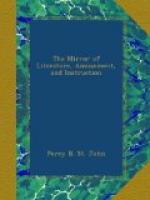Philosophy may breathe again. The author of “The Evenings at the Castle” was the Attila of philosophers;—she crushed Voltaire, considering him as a mauvais sujet; pursued Diderot and d’Alembert; breasted Rousseau; refuted the Encyclopaedia; and was always of the party in favour of the Altar and the Throne, excepting only the clay when the revolution of 1789 commenced.
Foul-mouthed people allege Madame de Genlis to have been a great coquette, which, is a calumny. She was virtue itself. No doubt she was the object of rude assaults; public declarations, scenes of despair, disguises, eulogies in verse, madrigals in prose—all were employed to seduce her affections; but she resisted always. To revenge her cruelty, they attacked her morals, and epigrams rained on her. She replied by her Memoirs—rather diffuse confessions, which Lavocat (the publisher) contrived to dilute further—but edifying, and which have demonstrated that if Mad. de Genlis was not canonized in her life-time, it was because there is no longer any religion to speak of, or that she neglected to cultivate interest with the Pope.
One poet had the audacity to put up Madame de Genlis’ honour at the Exchange for a dollar; the ladies of the Directory exclaimed against this; the Countess herself said nothing: she despised the exaggeration which nobody could credit. In truth, Madame de Genlis was quite as good as the particular Queen, whose modesty was only to fall before the millions of a Cardinal-Duke.
Mirabeau boasted, in one of his letters, that he had communicated his own tenderness to the charming tigress; but Mirubeau was a vain, good-for-nothing coxcomb, and the boudoir on four wheels which he presented as the theatre of his triumph, was a horrible invention. The proof is, that Madame de Genlis says nothing whatever about it in her Memoirs. Posterity should be just towards the illustrious Countess, and accept, as sincere, her revelations. Let us, then, consider her as the most virtuous of women; as the least arrogant; the most sensible; the most learned; for all, in fine, that she desired to appear; for Madame de Genlis never said what was untrue; she solemnly declares so.
Madame de Genlis had a talent that was very dear to her, but the title of a good housewife was that she coveted above all the rest. I can never forget the following circumstance, exemplifying the naif vanity of the pretension to be without pretension, which the noble lady sometimes assumed. I was anxious to see this celebrated person, and wrote to ask the favour of a brief interview. She appointed the following day. At twelve o’clock I presented myself;—Madame de Genlis was writing; she laid down her pen, and obligingly offered me a seat, then said—“Allow me, sir, to finish my pot an feu; above being a woman of letters, I value myself as a good housewife.” And the Countess scraped the carrots and the leeks, tied them up, put them into the soup-kettle, skimmed the meat, and neither forgot cloves nor fried onions. Then taking off her kitchen apron, came with very good grace to offer herself to my curiosity We talked upon art and literature; and I must say that she did not speak of her harp more than twice, of her talent for acting more than once, or of her facility of writing—very much more than six times.




